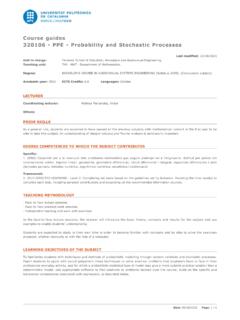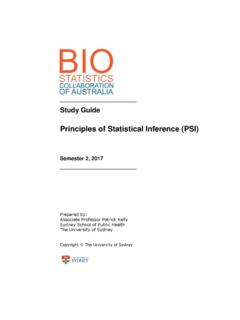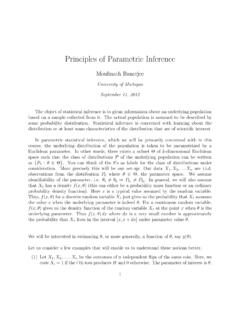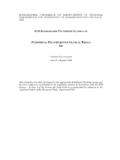Transcription of 200604 - IEA - Advanced Statistical Inference
1 Date: 11/06/2022 Page: 1 / 4 Course guide200604 - IEA - Advanced Statistical InferenceLast modified: 22/05/2022 Unit in charge:School of Mathematics and StatisticsTeaching unit:715 - EIO - Department of Statistics and Operations - UB - (ENG)Universitat de :MASTER'S DEGREE IN STATISTICS AND OPERATIONS RESEARCH (Syllabus 2013). (Optional subject).Academic year: 2022 ECTS Credits: : EnglishLECTURERC oordinating lecturer:GUADALUPE G MEZ MELISO thers:Primer quadrimestre:GUADALUPE G MEZ MELIS - A LEX S NCHEZ PLA - APRIOR SKILLSA dvanced Statistical Inference is mandatory for all graduate students in statistics or follow and take advantage of this course the Statistical knowledge required is that of an undergraduate-level in statistics ormathematics.* Basic mathematical analysis skills required: integration of functions of one or two variables, derivation, optimization of a function ofone or two variables.* Basic probability skills required: the most common parametric distributions, properties of a normal distribution, the law of largenumbers and the central limit theorem.
2 * Basic Statistical Inference skills required: using the likelihood function for simple random sampling (independent identicallydistributed data), Inference in the case of normality, estimation of maximum likelihood for parametric models with only one parameterand simple random 1 in Wood's "Core Statistics" and Chapter 1 in Gomez and Delicado's " Inference and Decision" include all the concepts andresults that are assumed to be known. Students will be required to review, achieve and internalize them before beginning the list of exercicis non-assessable but compulsory will be held in the second week of COMPETENCES TO WHICH THE SUBJECT CONTRIBUTESS pecific:3. CE-1. Ability to design and manage the collection of information and coding, handling, storing and processing CE-4. Ability to use different Inference procedures to answer questions, identifying the properties of different estimation methodsand their advantages and disadvantages, tailored to a specific situation and a specific CE-6.
3 Ability to use appropriate software to perform the necessary calculations in solving a CE-9. Ability to implement Statistical and operations research :2. EFFECTIVE USE OF INFORMATION RESOURCES: Managing the acquisition, structuring, analysis and display of data and informationin the chosen area of specialisation and critically assessing the results : 11/06/2022 Page: 2 / 4 TEACHING METHODOLOGYC onceptual sessions of hoursThe sessions present the subject material. The teacher might use the computer to present the and concepts are emphasized and a detailed look is given at those proofs with an added pedagogical 2, 4 and 5 in the book "Core Statistics" from Simon Wood will be of the material can be as well read in Chapters 1 to 5 of Gomez and Delicado (although in different order), these notes can bedownloaded from the materials will be provided for specific sessions of will be posted on the intranet and will be discussed in classStudents must come to class having prepared the problems and having thought about how to solve themThe professor will solve the problems and discuss with students their questions or other solution of these problems will be posted after the corresponding session on the LaboratoryR programs will serve to illustrate concepts, to complement the theoretical developments showing how Statistical computing is animportant tool in Statistical Inference .
4 Some exercises will be proposed in line with those discussed in class, to strengthen the OBJECTIVES OF THE SUBJECTThe Advanced Statistical Inference course provides a theoretical and applied basis for the fundamentals of Statistics. Its mainobjective is to train students to think in Statistical terms in order to to conduct a thorough professional habit. Also intended as aformative seed for the consolidation of young researchers in this area of science and technology while equipping students with theresources to continue their training and making them capable to read papers published in journals of completing the course the student :* has learnt about the different principles governing the reduction of a dataset and the different philosophies that may arise to solve aproblem.* knows the methods based on the empirical distrbution function and the likelihood function and know when and why how apply eachone* understands that the frequentist and Bayesian philosophy are two ways to approach a problem, not necessarily conflicting andsometimes complementary.
5 * be familiar with modern resampling techniques and view them as a formal /computational approximation well suited for use insituations where direct calculations are too complex or not available* know to write down the likelihood function in different situations and learn different techniques to maximize LOADTypeHoursPercentageHours small group15, large group30, study80, learning time: 125 hDate: 11/06/2022 Page: 3 / foundations of Statistical InferenceDescription:- Preliminars, notation and examples- Inferential questions. Walking through point estimation, hypothesis testing and interval estimation- The frequentist approach: point estimation, finite sample properties, Cramer-Rao bound, Hypothesis testing, Intervalestimation, Model checking and model comparison- The Bayesian approach: a brief discussionFull-or-part-time: 52h 50mTheory classes: 15hPractical classes: 4h 30mSelf study : 33h 20m2. The empirical distribution function.
6 Theory and numerical approachesDescription:- The empirical distribution function. Glivenko-Cantelli Theorem. Principle of substitution. The method of Introduction to Large sample properties: Delta method and consistencyFull-or-part-time: 32hTheory classes: 9hPractical classes: 3hSelf study : Likelihood Estimation. Theory and numerical approachesDescription:-Likelihood, log likelihood and score functions- Fisher information matrix, Cramer-Rao bound and UMVUE- Large sample properties of MLE. Consistency and Asymptotic Normality- Generalised Likelihood Ratio Statistic- AIC information criterion- Numerical approaches- EM algorithmFull-or-part-time: 40h 10mTheory classes: 9hPractical classes: 4h 30mSelf study : 26h 40mDate: 11/06/2022 Page: 4 / 4 GRADING SYSTEMThe assessment of Chapter 1 relies on a partial exam (EP). The partial exam (EP) will contain a theoretical part and some the assessment of Chapters 2 and 3 there will be 2 assignments of problems/practices with R (PRA) and a final exam (EF)The delivery of problems will be done at most in groups of twoThe final exam (EF) consists of problem final mark (N) is obtained from the marks of the delivered exercises and the marks of the partial and final exams according to theexpression:N = * PRA + * EP + * :- Olive, David J.
7 Statistical theory and Inference . Cham: Springer, 2014. ISBN Wood, Simon N. Core Statistics. Cambridge [etc.]: Cambridge University Press, 2015. ISBN Trosset, Michael W. An introduction to Statistical Inference and its applications with R. Boca Raton, FL: Chapman & Hall/CRC, Casella, G.; Berger, Roger L. Statistical Inference . Pacific Grove Duxbury, G mez Melis, G.; Delicado, P. Inferencia y decisi n (apuntes). Servei de fotoc pies, Wasserman, Larry. All of statistics : A concise course in Statistical Inference [on line]. Pittsburgh: Springer, 2004 [Consultation:15/05/2020]. Available on: ISBN Cox, Principles of Statistical Inference . Cambridge Univ Press, :- Millar, R. B. Maximum likelihood estimation and Inference : with examples in R, SAS and ADMB [on line]. Chichester: John Wiley &Sons, cop. 2011 [Consultation: 11/05/2020]. Available on: Chihara, L. ; Hesterberg, T. Mathematical Statistics with Resampling and R.
8 Wiley, 2011. ISBN Cuadras, C. Problemas de probabilidades y estad stica. Vol 2: Inferencia. Publicacions de la Universitat de Barcelona, Garthwaite, Paul H.; Jolliffe, Ian T.; Jones, B. Statistical Inference . 2nd ed. Oxford University Press, Shao, Jun. Mathematical statistics. 2nd ed. Springer Texts in Statistics, Ruiz-Maya P rez, L. ; Martin Pliego, Estad stica. II, inferencia. 2 ed. Madrid: Alfa Centauro, 2001. ISBN Boos, ; Stefanski, Essential Statistical Inference : theory and methods. Springer, Young, ; Smith, Essentials of Statistical Inference . Cambridge University Press, 2010. ISBN 978-0521548663.











